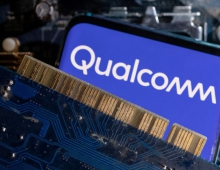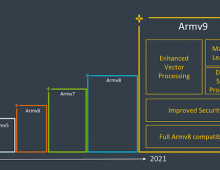
ARM Not Impressed With Intel Medfield Phone Chips
ARM CEO described Intel's efforts to enter the mobile
market with its new low-power Medfield SoC as "good
enough".
"It's inevitable Intel will get a few smartphone
design wins -- we regard Intel as a serious
competitor," said ARM CEO Warren East in an interview
with Reuters. "Are they ever going to be the leaders
in power efficiency? No, of course not. But they have
a lot more to offer."
"They have taken some designs that were never meant for mobile phones and they've literally wrenched those designs and put them into a power-performance space which is roughly good enough for mobile phones," he said.
Intel announced its entrance into the smartphone and tablet chip market earlier at CES, unveiling plans for Motorola Mobility and Lenovo phones running Google's Android system on Intel's new 'Medfield' chip.
ARM licenses its designs to 275 chip makers and hardware and software firms, and controls the vast majority of the mobile market.
East also talked about Microsoft's decision to make its Windos 8 OS compatible with ARM chip designs.
"We've waited a long time for this to happen. Another six months, another 12 months doesn't matter," said East. "I'd much rather wait however long it takes to get a quality experience than compromise."
ARM-based, Windows 8-compatible tablets are expected to be released in the second half of this year.
"They have taken some designs that were never meant for mobile phones and they've literally wrenched those designs and put them into a power-performance space which is roughly good enough for mobile phones," he said.
Intel announced its entrance into the smartphone and tablet chip market earlier at CES, unveiling plans for Motorola Mobility and Lenovo phones running Google's Android system on Intel's new 'Medfield' chip.
ARM licenses its designs to 275 chip makers and hardware and software firms, and controls the vast majority of the mobile market.
East also talked about Microsoft's decision to make its Windos 8 OS compatible with ARM chip designs.
"We've waited a long time for this to happen. Another six months, another 12 months doesn't matter," said East. "I'd much rather wait however long it takes to get a quality experience than compromise."
ARM-based, Windows 8-compatible tablets are expected to be released in the second half of this year.





















